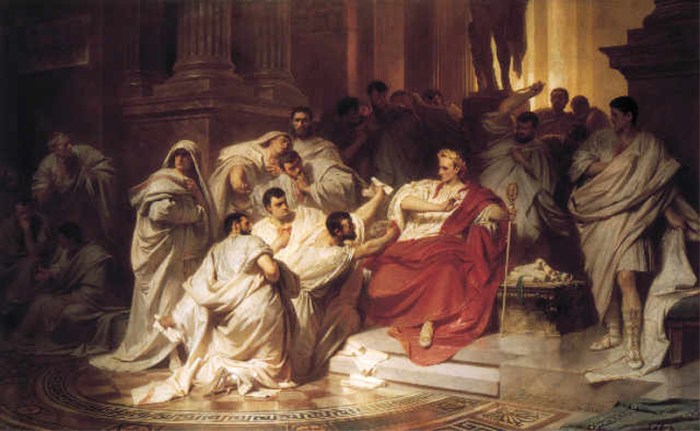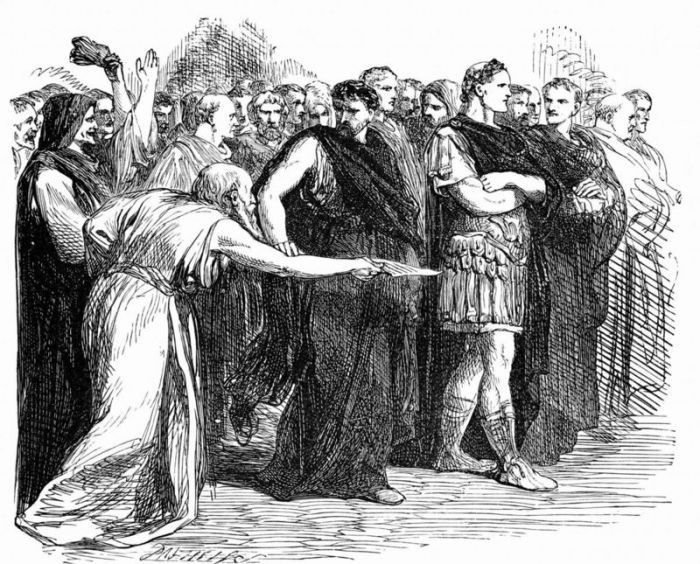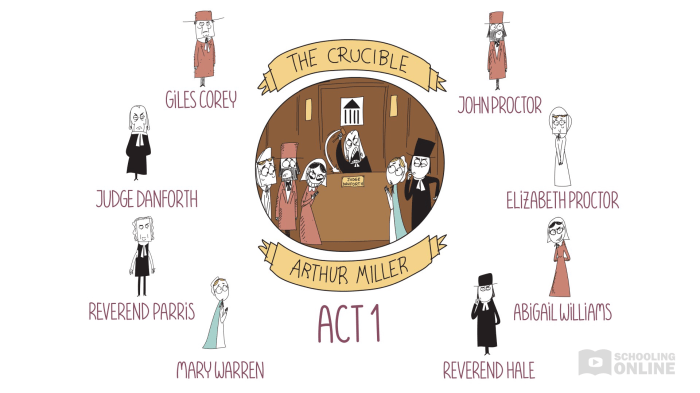Embark on a literary adventure with the Julius Caesar Act One Quiz, a captivating exploration into the depths of Shakespeare’s iconic play. Dive into the intricate web of characters, unravel the unfolding plot, and uncover the profound themes that resonate through the centuries.
Act One sets the stage for a tumultuous journey, where ambition, power, and loyalty collide. Prepare to encounter Julius Caesar, the enigmatic leader, and Brutus, the conflicted conspirator, as they navigate a world on the brink of chaos.
Character Analysis
Julius Caesar is a complex and multifaceted character who drives the plot of the play. He is a charismatic and ambitious leader who has risen to power through military victories and political maneuvering. He is also a flawed character, prone to arrogance and hubris.
Caesar’s character development is central to the play, as he gradually transforms from a respected leader to a tyrannical dictator.
Brutus’s betrayal is a pivotal moment in Caesar’s character development. Brutus is Caesar’s close friend and confidant, and his betrayal is a deep wound that shakes Caesar’s faith in humanity. The betrayal forces Caesar to confront his own mortality and the fragility of his power.
It also leads him to become more ruthless and suspicious, as he realizes that even those closest to him can turn against him.
Cassius plays a significant role in shaping Caesar’s fate. He is a cunning and ambitious politician who is envious of Caesar’s power. Cassius manipulates Brutus’s idealism and fears to turn him against Caesar. He is ultimately responsible for Caesar’s assassination, as he convinces Brutus to join the conspiracy against him.
Plot Summary and Structure

Act One of Julius Caesar introduces the main characters and sets the stage for the political and personal conflicts that will unfold throughout the play. The act begins with a street scene where a group of tribunes attempt to quell a riot caused by the commoners’ celebration of Caesar’s recent military victories.
Key Events
- The soothsayer warns Caesar to “beware the Ides of March.”
- Cassius reveals his plan to persuade Brutus to join their conspiracy against Caesar.
- Brutus struggles with his decision to betray his friend and join the conspiracy.
- The conspirators meet and make their plans to assassinate Caesar.
- Caesar ignores the soothsayer’s warning and attends the Senate meeting, where he is assassinated.
Dramatic Structure
Act One is divided into three scenes, each of which serves a specific purpose in establishing the plot and characters.
- Scene 1introduces the conflict between the commoners and the tribunes and foreshadows the political tensions that will lead to Caesar’s assassination.
- Scene 2focuses on Cassius’s plan to recruit Brutus to the conspiracy and Brutus’s internal struggle with his decision.
- Scene 3depicts the conspirators’ meeting and Caesar’s assassination, setting the stage for the rest of the play.
Soothsayer’s Prophecy, Julius caesar act one quiz
The soothsayer’s prophecy of “beware the Ides of March” serves as a powerful symbol of foreshadowing in the play. It creates a sense of suspense and anticipation, as the audience knows that something terrible will happen on that date.
Themes and Symbolism: Julius Caesar Act One Quiz

Act One of Julius Caesar introduces several prominent themes that shape the play’s narrative. These themes are intertwined with the use of symbolism to convey their significance.
Theme: Ambition and Power
- The play explores the corrupting influence of ambition and the thirst for power. Characters such as Caesar and Cassius are driven by their desire for dominance, which ultimately leads to their downfall.
- The assassination of Caesar serves as a cautionary tale about the dangers of unchecked ambition and the consequences of betrayal.
Theme: Loyalty and Treason
- Loyalty is a central theme in Act One, as the characters navigate their allegiances and the complexities of political alliances.
- The play questions the nature of loyalty and the choices individuals make in the face of conflicting loyalties.
Symbolism: The Storm
The storm in Act One is a powerful symbol of the political turmoil and impending chaos that will engulf Rome.
Symbolism: The Soothsayer’s Warnings
The soothsayer’s warnings serve as a foreshadowing of the tragic events to come. His prophecies create a sense of foreboding and highlight the inevitability of fate.
Imagery of Light and Darkness
The play employs contrasting imagery of light and darkness to foreshadow the coming conflict and the moral ambiguity of the characters.
The Julius Caesar Act One quiz can be a breeze if you’re well-prepared. If you’re looking for additional resources, check out this amicus curiae brief on AP government. It offers valuable insights into the legal system that can help you understand the political dynamics at play in Julius Caesar.
Once you’ve reviewed the brief, come back to the quiz and see how your score improves.
Language and Style
Shakespeare’s mastery of language is evident in Act One of Julius Caesar. He employs various rhetorical devices, including metaphors, similes, and personification, to create a vivid and engaging narrative.
Metaphors
Metaphors abound in Act One, enriching the text with depth and symbolism. For instance, Cassius refers to Caesar as a “serpent’s egg” (1.2.169), implying his potential for tyranny. Brutus, on the other hand, likens Caesar to a “colossus” (1.2.135), emphasizing his towering presence and the fear he inspires.
Similes
Similes, too, contribute to the play’s imagery and emotional impact. When Casca describes the storm, he compares it to “a madman striking the earth” (1.3.13), capturing the chaos and violence of the event.
Blank Verse
The use of blank verse, or unrhymed iambic pentameter, establishes a rhythmic and elevated tone for the play. The regular beat and flowing language enhance the speeches’ dramatic impact and create a sense of grandeur.
Foreshadowing
Shakespeare’s language also serves as a tool for foreshadowing. In the opening scene, the soothsayer’s warning to Caesar to “beware the Ides of March” (1.2.18) foreshadows his assassination. Additionally, Cassius’s description of Caesar as a “beast that we have let slip” (1.3.107) foreshadows the dangers of unchecked ambition.
Questions and Answers
What is the significance of the soothsayer’s prophecy in Act One?
The soothsayer’s prophecy foreshadows Caesar’s assassination and serves as a haunting reminder of the fragility of power and the inevitability of fate.
How does Brutus’s betrayal impact Caesar’s character development?
Brutus’s betrayal forces Caesar to confront his own mortality and the limits of his authority, ultimately leading to a profound shift in his perspective.

